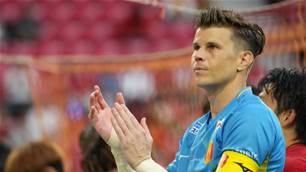Former Socceroos captain Craig Foster hopes a closer connection between athletes and their communities will become the silver lining of the coronavirus crisis.
"Which is a very rare opportunity for them because sport today is virtually year round, the time and energy demands are extremely high and this is a very rare moment when athletes are challenged by having time on their hands.
"And by applying it to helping others who they would otherwise perhaps never even meet, they're starting to learn about different social cohorts, different communities of vulnerable people, they're learning more about social justice, they're learning more about the world around them and they're also able to take back some control of their present environment."
Foster believes professional sport can mobilise in two crucial ways, through individual volunteering, but also in amplifying the message to sports' largest base: the grassroots.
"Many of us feel that sport has moved away from some of the core values and the essence of community and perhaps the relationship from top to bottom, from professional to amateur and grassroots is not as strong as it should be," he said.
"This is a phenomenal opportunity for professional sport to demonstrate connection with, respect for and better understanding of their actual grassroots community clubs.
"Because it's through those community clubs that sport can make a substantive impact for Australia right now ... the grassroots are extensive and extend to millions of people.
"And sport is starting to reorient to say, 'If we're to encourage our sport to mobilise here, we could actually make a huge impact in assisting our countrymen and women to get through this together.
"And ultimately that's what sport is about - it's about togetherness and it's about community."
The benefits go both ways.
Being involved in sport plays a crucial role in mental health and Foster believes the "togetherness" sports clubs can create through collective volunteering efforts can maintain the connections typically forged on the training track.
"For millions of Australians, their main social connection network is through their sporting club or team and at the moment, that also has been obliterated," Foster said.
"Sport is postponed, sport is off - it's not happening.
"There's no discussions to be had on a Tuesday night about how sore your hamstring is, there's no laughter about how badly someone is training, there's no opportunity to be with your tennis coach and discuss the poor quality of your backhand.
"There's no opportunity to coach your netball team ... particularly for the tens of thousands of community clubs, that immediate social connection that we need so greatly has been severed.
"And what Play for Lives is saying to the national sporting community is 'keep that alive' ... (and) we keep it alive not by playing on field but by helping others.
"And by doing so we are discovering a new sense of compassion, that there might be a better way for sport to operate."
Related Articles
.jpeg&h=172&w=306&c=1&s=1)
Socceroos prodigy returns to A-League after horror run

Star keeper's exit heralds hero's return at A-League giant













